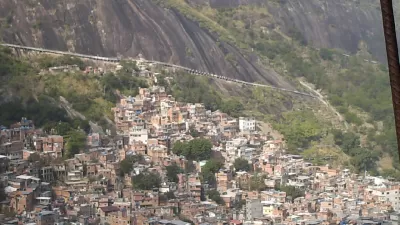Following the surge of “pacifying” missions in many of Rio de Janeiro’s famed favelas, Forbes’ Ricardo Geromel discusses the arrival of private sector investments and how they may evolve in the future.
Since the launch and installation of Pacifying Police Units in many of Rio de Janeiro’s largest favelas, businesses that once dismissed the neighborhoods as unstable danger-zones are now strategizing their entry into “untapped markets”.
And these markets, as Geromel writes, are no small matter. In addition to housing a population larger than Portugal’s, a recent survey by Insituto Datapopular found that favelas generate approximately R$ 13 billion each year. With fears of insecurity quelled by the presence of the Pacifying Police Units (UPP in Portuguese), businesses are now rushing in.
Geromel cites the case of Ricardo Eletro, a national retailer that has invested more than R$1 million in a unit in Rocinha, the country’s biggest favela. In the same neighborhood, another national retailer, Casas Bahia, invested in a 1,400 square meter property. And, in another of Rio’s smaller favelas, multinational Banco Santander has opened its first branch.
New investments from private sector players, Geromel writes, could bring long-term improvements to social and economic conditions in the favelas. Geromel cites the case of TenSports Marketing and the Indoor Soccer Federation of Rio de Janeiro, who have recently partnered to sponsor a soccer tournament between several of the city’s favelas. As part of the project, called the “Pacified Rio Cup,” the companies are investing in the construction and renovations of local soccer fields and recruiting local residents to work on-site.
In addition to new sports facilities and temporary employment opportunities, Geromel sees the potential for new sponsorships and marketing initiatives that would bring more money into these low-income neighborhoods. “…thanks to ‘Pacified Rio Cup,’” Geromel writes, “I imagine companies paying large sums and building amazing soccer fields in the favelas in exchange for publicity.”
Geromel aligns his hope for change with those of Rio’s mayor, Edouardo Paes who, in a recent TED talk, proclaimed that “Favelas are not always a problem. Favelas can sometimes really be a solution.”
FULL STORY: Eduardo Paes, Rio de Janeiro's Mayor, Reveals Where The Money Is Heading To In Brazil: Favelas

Alabama: Trump Terminates Settlements for Black Communities Harmed By Raw Sewage
Trump deemed the landmark civil rights agreement “illegal DEI and environmental justice policy.”

Study: Maui’s Plan to Convert Vacation Rentals to Long-Term Housing Could Cause Nearly $1 Billion Economic Loss
The plan would reduce visitor accommodation by 25% resulting in 1,900 jobs lost.

Why Should We Subsidize Public Transportation?
Many public transit agencies face financial stress due to rising costs, declining fare revenue, and declining subsidies. Transit advocates must provide a strong business case for increasing public transit funding.

Wind Energy on the Rise Despite Federal Policy Reversal
The Trump administration is revoking federal support for renewable energy, but demand for new projects continues unabated.

Passengers Flock to Caltrain After Electrification
The new electric trains are running faster and more reliably, leading to strong ridership growth on the Bay Area rail system.

Texas Churches Rally Behind ‘Yes in God’s Back Yard’ Legislation
Religious leaders want the state to reduce zoning regulations to streamline leasing church-owned land to housing developers.
Urban Design for Planners 1: Software Tools
This six-course series explores essential urban design concepts using open source software and equips planners with the tools they need to participate fully in the urban design process.
Planning for Universal Design
Learn the tools for implementing Universal Design in planning regulations.
Caltrans
Smith Gee Studio
Institute for Housing and Urban Development Studies (IHS)
City of Grandview
Harvard GSD Executive Education
Toledo-Lucas County Plan Commissions
Salt Lake City
NYU Wagner Graduate School of Public Service



























